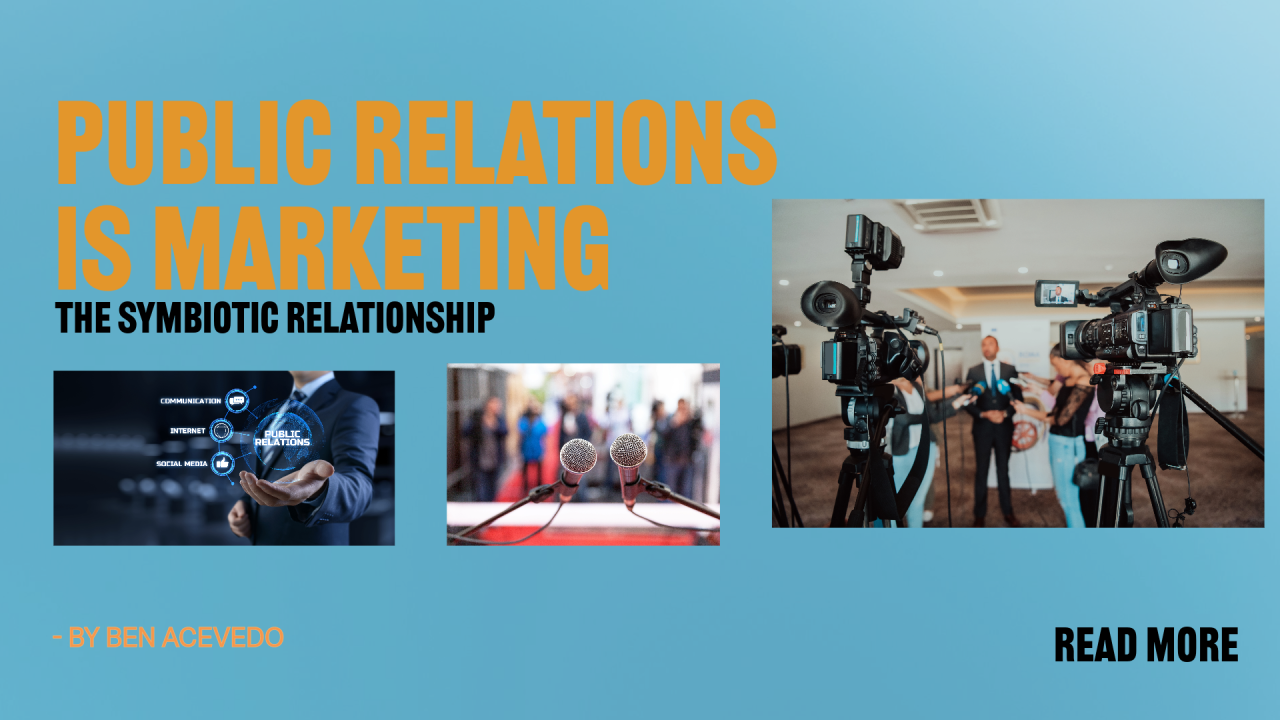
Public Relations (PR) is Marketing: The Symbiotic Relationship
Public Relations (PR) and marketing are two essential components of a comprehensive business strategy, each with its unique focus and methods. However, the line between PR and marketing is often blurry, and they share a symbiotic relationship that can significantly impact a company's success. In this article, we will explore how PR is marketing and why this interconnectedness is crucial for businesses in today's competitive landscape.
Building Brand Image: PR and marketing are both integral to shaping a brand's image. While marketing primarily focuses on promoting products or services, PR concentrates on managing a company's reputation and creating a positive perception. These efforts are intertwined because an impeccable brand image, created and maintained through PR, directly influences marketing effectiveness. When customers trust and respect a brand, marketing campaigns resonate more effectively, leading to higher conversion rates and customer loyalty.
Content Creation and Distribution: High-quality content is at the core of both PR and marketing strategies. PR professionals craft compelling stories, press releases, and articles that help generate media coverage and enhance a company's credibility. Marketing relies on content to engage and inform target audiences, whether through blog posts, social media updates, or email campaigns. The two functions complement each other by sharing content creation resources, ensuring a consistent brand message across various channels.
Influencer Engagement: Influencer marketing is an area where PR and marketing converge seamlessly. PR teams identify influencers who align with a brand's values and reputation. These influencers play a significant role in shaping the public's perception of a company. Meanwhile, marketing professionals collaborate with influencers to promote products or services. The collaboration not only leverages the influencer's credibility but also strengthens the overall brand image through association with reputable figures.
Crisis Management: PR is a critical component of crisis management, as it helps companies navigate challenging situations that could harm their reputation. Marketing strategies must adapt during crises, and effective communication is vital. PR professionals step in to manage communication with the public, media, and stakeholders, working in tandem with marketing teams to minimize damage and rebuild trust.
Customer Relationship Management: PR is instrumental in building lasting relationships with customers, stakeholders, and the public. Effective PR strategies establish a sense of trust and credibility, which forms the foundation for long-term customer relationships. Marketing, on the other hand, uses these relationships to drive sales and encourage brand loyalty. Both PR and marketing rely on strong customer relationships, making it clear that one is incomplete without the other.
Data and Analytics: Data-driven decision-making is a common thread between PR and marketing. PR professionals use data to monitor media coverage and assess public sentiment, allowing them to refine their strategies and adapt to changing perceptions. Marketers rely heavily on data and analytics to measure campaign effectiveness, track customer behavior, and refine their strategies. These intertwined efforts emphasize the importance of leveraging data in both disciplines to gain a competitive edge.
Goal Alignment: Ultimately, both PR and marketing share the same overarching goal: to boost a company's success. PR contributes to this success by creating a positive brand image, enhancing credibility, and fostering goodwill among stakeholders. Marketing capitalizes on these PR-driven advantages to generate leads, increase sales, and maximize revenue. The alignment of these goals emphasizes how PR and marketing are, in essence, two sides of the same coin, working together to achieve overarching business objectives.
In conclusion, the symbiotic relationship between PR and marketing is clear and powerful. PR is marketing because it lays the foundation for successful marketing strategies. Effective public relations builds trust, credibility, and a positive brand image, providing marketing teams with the ideal environment to promote products and services. To thrive in today's competitive business landscape, companies must recognize and leverage the interconnected nature of PR and marketing to achieve their goals.